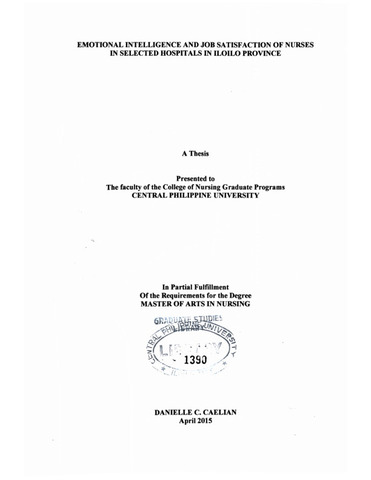Emotional intelligence and job satisfaction of nurses in selected hospitals in Iloilo province
요약
This descriptive-relational research was conducted to determine the personal characteristics, emotional intelligence of the nurses with its sub-components of emotional awareness, managing one’s emotions, self-motivation, empathy, and coaching others emotions, and job satisfaction. It further aimed to determine if there is a relationship between the respondent’s personal characteristics, their emotional intelligence and job satisfaction. Using the one-shot survey design, all 101 nurses from two government hospitals and one private hospital in the province of Iloilo were involved. The data were collected, and analyzed using SPSS version 17 software program for Windows. The results of the study show that the mean age of the nurses is 31.63 years old. Majority were female and single, with a position of staff nurse in the ward. The average salary is P 13,066.73 and the average length of service is 6.09 years. Most of them needed some development in the components of emotional intelligence such as managing one’s emotions, self-motivation, empathy, and coaching other’s emotions.
In the component of emotional intelligence and emotional awareness, there are equal percentages of the respondents who have definite strength and needed some development. Most of the nurses needed some development in their overall emotional intelligence, and a considerable proportion registered a definite strength. The nurses as a whole group were satisfied with their job in almost all areas evaluated, with the highest satisfactory rating in the physical conditions in which they work, their fellow workers and their immediate manager, but lowest in the rate of pay for nurses. Majority of the nurses rated satisfactory in their overall job satisfaction with a very small percentage who were dissatisfied. Personal characteristics (age, sex, civil status, area of assignment, position, salary, and length of work experience) were found to have no influence on the five components of emotional intelligence namely: emotional awareness, managing one’s emotions, self-motivation, empathy, and coaching other’s emotions. There was a negligible relationship between personal characteristics (age, sex, civil status, area of assignment, position, salary, and length of experience) and overall level of emotional intelligence. There was a negligible relationship between personal characteristics (age, sex, civil status, area of assignment, and length of service) and overall level of job satisfaction. A low correlation was noted between position and overall level of emotional intelligence. Furthermore, salary was found to have a substantial correlation with overall job satisfaction.
There was a substantial correlation between the emotional intelligence sub-skill of emotional awareness and overall level of job satisfaction. A low correlation was found between managing one’s emotions, self-motivation and coaching others’ emotion and overall job satisfaction. More so, a negligible relationship was found between empathy and overall job satisfaction. There was a low correlation between overall level of emotional intelligence and overall level of job satisfaction. Majority of respondents with definite strength were satisfied with their job. However, a considerable proportion who needed substantial development were also satisfied. Based on the findings of the study, the following conclusions were derived: Respondents were young and nursing is still a female dominated profession. The fact that most of them are young, it is understandable that most of them are single. They were mostly assigned in the ward. The nurses as a whole had an average level of emotional intelligence which needs some development. Emotional intelligence is a developing skill than can be enhanced by accumulated life experiences. However, they need to harness their skills more in order to further strengthen their emotions. Personal characteristics such as age, sex, civil status, area of assignment, position, salary, and length of service have no influence on the five components of emotional intelligence. Position and salary have an influence on the job satisfaction of nurses. The higher the job position, the higher the degree of satisfaction. Higher positions mean more assignments that make use of their abilities and the chance to practice autonomy. Higher salary also gives nurses satisfaction that they are well compensated and are able to provide more for themselves and their family. It has been said that money cannot buy happiness, but it can add some degree of satisfaction to hardworking nurses. All the skills of emotional intelligence except empathy have an influence on job satisfaction. The stronger the skills on emotional awareness, managing one’s emotions, self-motivation, and coaching others’ emotions, the more likely job satisfaction will increase. Emotional intelligence allows people to better understand and manage their emotions. This study indicates that emotional intelligence influences job satisfaction. By understanding and controlling emotions, a person can gratify one’s life and work environment.
기술
Abstract only
추천 인용
Caelian, D. C. (2015). Emotional intelligence and job satisfaction of nurses in selected hospitals in Iloilo province (Unpublished Master's thesis). Central Philippine University, Jaro, Iloilo City.
유형
Thesis주제
키워드
학과
School of Graduate Studies정도
Master of Arts in Nursing선반 위치
GSL Theses 610.73072 C116
물리적 설명
xi, 127 leaves



